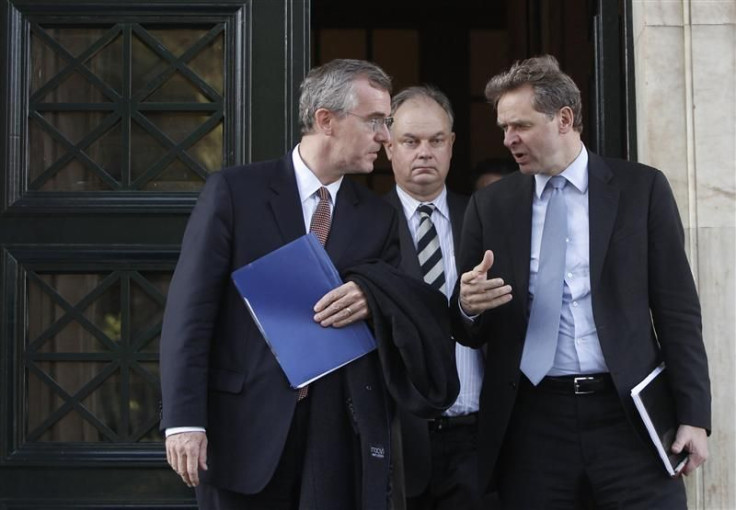Greece's New PM Heads for Brussels in the Search for Cash

Greece's new prime minister headed to Brussels on Sunday to fight for the aid Athens needs to avoid bankruptcy, even as one of his coalition backers refused to give a written pledge to support reforms and a public-sector union readied itself for strikes.
Lucas Papademos must convince the International Monetary Fund and the European Union to give Greece the 8 billion euros it needs to avoid a mid-December default, but the conservative New Democracy party has refused to meet their most basic demand.
Representatives of the so-called troika of the IMF, EU, and European Central Bank wrapped up initial talks with the conservative party and its partners, the Socialists of fallen Prime Minister George Papandreou and the far-right LAOS.
But during the visit, New Democracy head Antonis Samaras refused to give a written guarantee that he would continue to do whatever it took to meet the terms of the bailout no matter who wins a vote tentatively set for Feb. 19.
According to LAOS party head George Karatzaferis, who met the troika team on Sunday, the international lenders would not release Athens' sixth aid installment without the pledge.
I believe there is no wiggle room at all, and we have to find an arrangement so that the money can be released in time to cover the country's pressing needs, Karatzaferis told reporters, adding that he would sign the pledge.
Samaras told the troika officials on Sunday that a verbal vow not to oppose existing reforms should suffice.
But in what analysts say is a move to distance himself from painful austerity measures and win votes ahead of the election, he also said last week he wants to win a full majority so he can reverse reforms with which he disagrees.
Samaras, a Harvard-educated economist, has long opposed the tax hikes and spending cuts backed by his bitter rival -- and former college roommate -- Papandreou, saying pro-growth measures would be more effective.
That has angered the international community, who have watched Greece's failure to meet its bailout targets help the crisis spread to other Eurozone states and drive up debt yields in Italy, France, and even Germany.
According to a source close to the troika, the team was to depart Athens on Sunday. It is expected to return later to discuss whether it will release an 8 billion euro tranche of aid, without which Athens will default in mid-December.
Risking Aid
Along with the December aid tranche, the troika must also judge whether Greece is worthy of a 130 billion euro bailout agreed last month to replace the original 110 billion euro package that has made up its aid so far.
Papademos, a former vice president at the ECB, was due to fly to Brussels later on Sunday. He was scheduled to meet the EU's top leaders, Jose Manuel Barroso and Herman van Rompuy, on Monday and Eurogroup President Jean-Claude Juncker on Tuesday.
But Papademos' government faces a number of hurdles on implementing reforms, including staunch opposition by unions and an angry population hit by years of austerity measures that have pushed the country's economy into a fourth year of recession.
On Sunday, the union at Greece's biggest power producer PPC threatened to call a wave of strikes in opposition to plans to loosen the firm's grip over Greece's coal reserves.
Under its bailout, Athens needs to lift state-controlled PPC's de facto monopoly on the production of lignite coal, the backbone of the country's power production, and to try to sell the state's stake in the generator.
But PPC labor Union GENOP said it would launch rolling strikes if the cabinet tries to do it.
This government of special interests, which was imposed on the Greek people against its will, has to know it will have to overcome many obstacles before it manages to sell off the Greek people's property, the union said in a statement.
Greek media -- often split along party lines -- were also divided over Samaras's stance, with the pro-New Democracy weekly Typos Tis Kyriakis saying he would eventually win a compromise from Athens' lenders and would not have to back down.
New Democracy officials are satisfied because Samaras is winning his fight with the Europeans regarding the written assurances, the paper wrote.
But the left-leaning Eleftherotypia said Samaras, in trying to appease a populist faction in his party that disagreed with his moves over the past two weeks to join the coalition, could endanger next month's aid payment.
Samaras's refusal to sign this commitment is putting the ... installment in danger, and it might undermine all the moves he has made over the last 15 days, the paper wrote.
(Writing by Michael Winfrey)
© Copyright Thomson Reuters {{Year}}. All rights reserved.





















